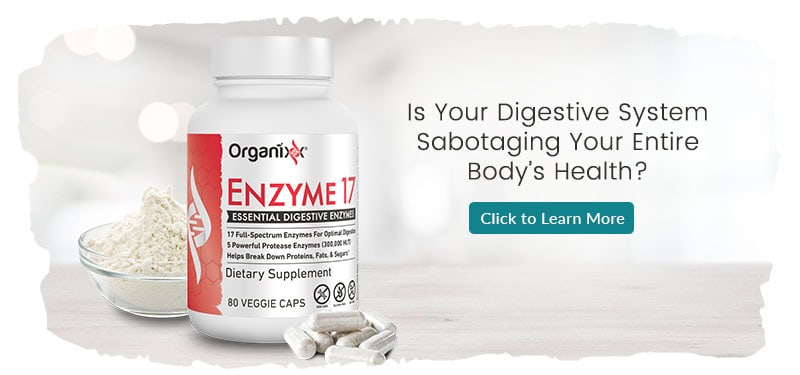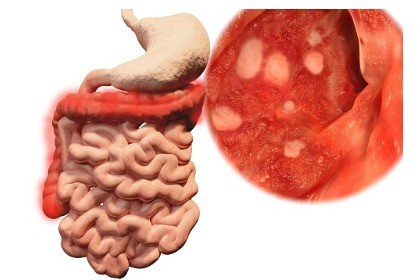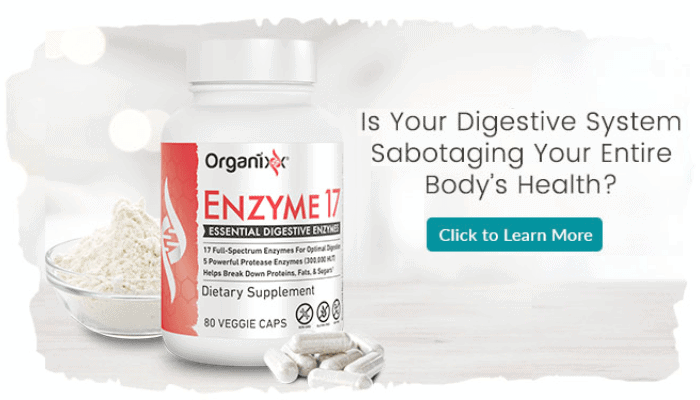Video Transcript:
Sharon B.’s question today is about constipation and bloating. She says, “Please help me, perhaps the medication I’m taking for Parkinson’s may be the cause.” She asks, “What can I do to help with digestive issues?”
So, I’m excited to share with you several options to help support your overall gut health. And it involves really kind of four facets to promoting balance from your oral health, all the way to your large intestine. And everything in between, digestively.
Support Gut Health with Probiotics
We want to support your mucosal lining, we want to add in probiotics. And one of my favorites to recommend is ProBiotixx+ here that we have that taps into an amazing single gut strain of bacteria that has been highly, highly beneficial at supporting overall optimal gut health.
Increase Fiber Intake
I also recommend making sure we’re increasing your fiber intake, especially for folks that are constipated. Sometimes they might be dehydrated and then they’re not getting enough fiber. So, getting enough water and getting enough kind of soluble insoluble fiber, the blends of that, aiming for 35 to 40 grams of fiber a day, plus really good high-quality mineral-dense water, is a good way to get things moving. That can eradicate constipation.
Supplement with Magnesium
Another amazing thing that eradicates constipation is magnesium. So, adding the Magnesium 7 to the blend is going to be powerful. Now this is a very beneficial, multi- full-spectrum magnesium, and there will be some magnesium forms that motivate the bowels more than others. But overall, magnesium will clear out excess fluid floating through and roaming through your body via inflammation. That will actually flush more excess fluid into the digestive process, hydrating the bowels and moving the bowel contents more readily.
Detox the Liver
The other thing that we may want to zero in is supporting your liver. And that becomes a really key kind of intersection between the upper GI and the lower GI. And so, if we are dealing with maybe values on your labs of high cholesterol, high triglycerides, maybe C reactive proteins elevated, a liver detox, or a liver support would be helpful.
Add Enzymes to Help Combat Malabsorption
And malabsorption can be a factor. So not digesting food properly or absorbing, breaking down, digesting, and assimilating, and absorbing the nutrients and the food that you’re consuming. That’s where adding an Enzyme 17, where we have 17 assorted compounds and enzymes that help you break down and to assimilate your food so that we have better absorption and movement through the digestive process.
Identify the Root Cause Through Testing
And I also recommend this month, I am hosting a private workshop where I’m digging further into digestive health. It’s called A Healthier Gut, Happier You. This is a private workshop and I will post a link where you can gain access to that. And I recommend you take that because I’m going to be digging into the assorted elements and components of the entire digestive process, and really how to zero in on what might be causing the constipation, what might be causing the bloating, certain tests that you might want to look at taking.
But overall, we need to support your oral microbiome starting in the oral cavity. We need to support your large intestinal microbiome, and we need to add those good things like healthy fiber and more water and helping detox the liver are going to be critical.
So, I hope that is helpful for you, Sharon. Thanks so much for commenting and sending in your question. And I look forward to helping you in the future.
Magnesium deficiency is linked to stress, diabetes, heart disease, osteoporosis, chronic fatigue syndrome, depression, anxiety, trouble sleeping, sore muscles, migraines, and many more debilitating health conditions.
If your body needs magnesium, you want the most beneficial kind your body can actually absorb. Organixx Magnesium 7 gives you seven (7) of the very best, most bioavailable types of elemental magnesium available.

Video Transcript:
Today, I want to talk to you about how to optimize health for men, and this is a really important topic because a lot of men rely on their partners, their spouses, to give them advice and tips on what supplements to take. Often, we as women in our households are supplying our gentlemen with supplementation.
Support Your Healthy Habits
So today, I’m going to offer some advice for any of you ladies who want to power up and support your male partner’s health and enhance their wellness, as well as any of you gentlemen looking for some basic guidance to help support your overall health. And this is going to really support and supplement any of the good, healthy lifestyle habits and maybe current lifestyle changes you’re implementing where you’re eating healthy foods, maxing out your sleep, and lowering your stress.
Address Nutritional Deficiencies
So, the first and most important thing for men to consider taking is a whole-food, plant-based supplement, and this is really, really critical because the multivitamin that has a good amount of bioavailable, plant-based nutrition can really create a foundational piece where you get a lot of the daily requirements of your nutrients, and a lot of health issues, when we look at aging and degeneration within the body, a lot of our problems or challenges ultimately come back to nutrient deficiencies.
So, I’m very excited to recommend the Multi-Vita-Maxx. This is our plant-based, powerful multivitamin. You’re going to get all of the required daily requirements of both your vitamins as well as key minerals like magnesium, and zinc, and chromium, which is really important for gentlemen looking to balance their blood sugar levels. I also like that this is a fermented form of a multivitamin, which enhances the bioavailability of this nutrition.
Get the Gut Healthy
Now, the second thing that’s really important is for gentlemen to support their gut health. We have a term that we reference to the balance of bacteria in the gut, and we call it the microbiome. That’s an assortment of bacteria that we want to be balanced and we want it to be very plentiful and very similar to like a coral reef – we want to have multiple types of bacteria that create this kind of rainbow cascade of good bacteria that balances our body.
And in one of my masterclasses, I host masterclasses every month, I have one of my masterclasses that digs into mastering your gut health and ultimately supporting your gut microbiome. One of the things I share in that class is that the microbiome, our microbes, the actual bacteria, enhances our hormone levels and it can actually influence our immune system and it can influence the inflammatory response in the body.
So, for any gentlemen who might be dealing with diabetes, or gout, or liver imbalances, maybe elevations in cholesterol and triglycerides, or even gentlemen who might be dealing with prostate imbalances, it’s really important for us to look at adding a good probiotic.
And we have ProBiotixx+, which is a very powerful form of L. plantarum, which we know is one of the super plentiful bacteria types that can help culture and rebalance your gut. So, making sure you get a good probiotic can be very beneficial in enhancing your overall gut health, which can balance your digestive grievances like IBS, or CIPO, or gas and bloating after consuming a meal, but it can also power up our brain health and balance our hormones.
Combat Inflammation to Prevent Illness & Disease
Now, another thing that is really important for men is to address inflammation. Ultimately, inflammation is the root of all illness and disease within the body, and systemic inflammation is something we need to combat. And signs or symptoms of inflammation can be swelling, it can be elevations in enzyme levels like our ALT and AST – those are labs that identify enzyme levels in our liver. We will present with hormone imbalances. Men will have elevations in prostate markers like PSA will be elevated or experience benign prostatitis. Other individuals might experience heart disease. And so rooted behind all of these illnesses and diseases is ultimately inflammation. Our cells, our cytokine process is overwhelmed and heightened, and there are really two ways that I use some supplementation here to combat inflammation.
The first thing is magnesium, a very well-balanced, multi-magnesium, like we have Magnesium 7. This can be really helpful in minimizing inflammation that gentlemen experience in their joints. Maybe you have joint pain, or osteoarthritis, or rheumatoid arthritis, and even gout.
Swelling is a byproduct of inflammation. So, if you notice you’re holding more fluid, Magnesium 7 is what I recommend. I’m kind of an expert in the swelling category, I’m specialized in lymphatic therapy, which is all about moving the excess fluid in the body. We use magnesium to flush fluid out of the body and it will flush fluid through the kidneys and bladder and you might notice a reduction in fluid retention of upwards of three to five pounds on the scale. So, Magnesium 7 is great for lowering your inflammation levels.
Address the Reduction in Stomach Acid & Enzymes As We Age
And then, last and final is at the age of 30, for all of us, men and women, we have a reduction in stomach acid levels and we start to notice that the pancreas is not producing enough digestive enzymes. That ends up leading to digestive grievances, imbalances in our digestive process, an inability to digest our food, assimilate the nutrients, and power up the body. That can also lead to constipation, and leaky gut, and gut-brain, gut-heart, gut-thyroid imbalances.
So, one of the best ways to combat this lowered stomach acid level and a reduction in digestive enzymes that your pancreas is producing – which by the way can often be an undercurrent for diabetes – Enzyme 17 is something you want to add to your daily practice and this is something where you take two of these supplements, about 20 to 30 minutes before you consume a meal.
Enzyme 17 is one of the most plentiful enzyme blends that is out there on the market. It’s one of my favorite products we have here at Organixx, and it can help your body digest and break down the assorted macro and micronutrients that you need to support your body.
Additionally, here is a bonus tip that I tell all my patients. If you are dealing with any inflammation, or maybe you have digestive imbalances you notice. Maybe there are food particles that you’re passing in your bowel contents. Enzyme 17 is something you can take at night on an empty stomach and it will help reduce the digestive grievances and will help clear up systemic inflammation.
So, that’s a little bonus tip, but overall, these four items are going to be very helpful in supporting overall men’s health, and are basic foundational elements that every gentleman should add to his daily supplement regimen. So, that’s my tip for you and I hope you share that with any of the gentlemen in your life. And gentlemen, if you have any questions about health and wellness, make sure you comment and hit that reply button and I will be taking questions and answering them in future videos.
Organixx Enzyme 17 contains a whopping FIVE kinds of powerful protease enzymes in combination with one of the most advanced enzyme blends on the planet. It’s scientifically designed to help your body break down and process nutrients for better absorption, digestion, and overall health.

Improving Your Digestive Health
Experts are conducting more and more research on the gut microbiome (your digestive system) and discovering links between gut health and what were once thought to be unrelated health concerns. Depression and anxiety, autoimmune disorders, even skin conditions like acne, eczema, and psoriasis can be linked to an imbalance of your gut bacteria.
The good news is there are some fantastic supplements, digestive enzymes, and probiotics that can help you right the wrongs of everyday life and curb your tummy troubles.
Signs of an Unhealthy Gut Microbiome
Beyond just the food and drink you consume, other issues can affect your gut health. Your gut bacteria can be thrown off by:
- Stress
- Disrupted sleep
- Smoking
- Use of certain antibiotics
- Sedentary lifestyle
An imbalance can manifest itself in many ways. Some symptoms of poor gut health are:
- Bloating and cramping
- Chronic diarrhea or constipation
- Malabsorption/malnutrition
- Upset stomach
- Constant fatigue
How to Improve Your Digestive Health
For proper gut health, you must have the correct balance of the necessary microorganisms in your digestive system. The fact that there are over 500 different microbe species in your digestive system may make this balancing act seem impossible, but there are some simple steps you can take to help improve your overall health.
- Eat a diet filled with prebiotics such as garlic, onions, bananas, and whole oats, as well as probiotics, particularly fermented foods like yogurt, sauerkraut, and kimchi.
- Reduce your sugar consumption.
- Exercise regularly.
- Reduce stress.
- Take a daily full-spectrum digestive enzyme.
Start Improving Gut Health Today
If you are suffering from imbalanced gut bacteria, chances are every day is a physical and psychological struggle. Taking control of your digestive issues can make a world of difference. Start out easy by introducing digestive enzymes and probiotics into your daily routine, and then branch out into a better way of eating. You’ll be glad you did.
Organixx Enzyme 17 contains a whopping FIVE kinds of powerful protease enzymes in combination with one of the most advanced enzyme blends on the planet. It’s scientifically designed to help your body break down and process nutrients for better absorption, digestion, and overall health.

Though it’s not often talked about in popular media, there is a link between digestive enzymes and weight loss. In fact, the connection between digestive enzymes and body composition is significant, representing one of the most overlooked factors when trying to forge a healthy weight management plan – both for people who are overweight or obese, as well as underweight.
If you struggle with persistent weight issues that just won’t relent, you might have a lingering enzyme deficiency that’s inhibiting your body’s ability to digest food properly and dispose of waste – leading to fat accumulation, muscle deterioration, or worse.
Too Few Digestive Enzymes = Incomplete Digestion
According to the United States Centers for Disease Control and Prevention (CDC), more than 22 million Americans suffer from gastrointestinal problems that stem from incomplete digestion [1]. And as it turns out, incomplete digestion is often a factor of not having enough digestive enzymes.

If you suffer from gas, bloating, or one of the other usual suspects of poor digestive health, chances are you’re not getting enough enzymes from your food. And since enzymes are where digestion starts, this is the first thing you want to address if you’re having digestive system troubles. If left unchecked, a lack of enzymes can slow down your metabolism over time and throw your body into biological disarray.
How Different Body Types Are Impacted by Enzyme Deficiency
For naturally thinner people (e.g., the ectomorph body type), they might start to notice that no matter how much they try to eat, they can’t seem to gain any weight. For more rounded body types (e.g., endomorphs), they might be unable to lose weight no matter how many different diets they attempt.
The circumstances will be different for each individual. Still, the principle remains the same: if your body can’t break down food into molecular-sized components that your body can use, then your weight is sure to suffer in one negative direction or the other. Not only that, even worse health problems are likely to follow if the issue isn’t addressed.
Prolonged Incomplete Digestion Is a Recipe for Metabolic Disaster
It only makes sense that if your body isn’t getting the nutrition it needs due to poor digestion, then it’s not going to function on all cylinders. And your metabolism is often the first thing to suffer, driving a wedge between your efforts to either bulk up or slim down and see results [2].

On the one hand, malnutrition resulting from a digestion-inhibiting enzyme deficiency probably means that your body isn’t assimilating enough calories, which for some people could cause unwanted weight loss.
At the same time, metabolism can slow down to the point that food remains in an undigested state and starts to compact itself in the gut, cascading into unwanted weight gain.
When food particles linger in the colon for too long undigested, they tend to attract increasing levels of bacteria (both good and bad) that try to get it moving. This can lead to a condition known as small intestinal bacterial overgrowth, or SIBO, which is similarly associated with weight gain.
This mass influx of bacteria tends to create excessive levels of methane gas that inhibit the small intestine from effectively doing its job. Intestinal villi, or the small, finger-like projections that line the surface of the intestinal wall, start to binge like they’re at an all-you-can-eat buffet, and all these calories begin to pile on as unwanted fat.
Leptin Tells Your Brain When It’s Time to Stop Eating
In scenarios like this where digestive enzymes aren’t readily available to act as digestive gatekeepers, your body’s probiotic stores will attempt to fill the void. But this can cause your insulin levels to spike, followed by a degradation in the functionality of leptin, a hormone produced by your body’s fat cells that essentially tells your brain when it’s time to stop eating [3].
Leptin oversees how your body converts food into either energy, muscle, or fat, in just the right amounts. However, should your body develop a resistance to leptin due to a lack of digestive enzymes, not only will your food not digest properly but what it digests into will also go awry.

While insulin plays a vital role in managing blood sugar levels as part of this process, the more insulin you have circulating in your bloodstream, the less leptin will be able to do its job. This can lead to the formation of hyperinsulinemia, which can spike blood sugar levels so high that your body stops converting food to energy, and instead stores it as fat.
Dr. James Johnson, PhD, is an associate professor of medicine at the University of British Columbia in Vancouver, Canada. According to Dr. Johnson, too much insulin, and thus not enough functional leptin, can reprogram the body “to really hold onto its nutrients and not burn any of them” – which is bad news from a weight management perspective [4].
Sugar, it turns out, is one of the primary drivers of the obesity epidemic, and this is part of the reason why. Rather than converting the carbohydrates you consume into energy, your body packs them on as fat, which further drives insulin and leptin resistance, creating an endless and vicious cycle of unwanted weight gain.
All of this can be traced right back to poor digestion, which is triggered by an enzyme deficiency in many cases. In these instances, fixing the problem can be as simple as intaking more digestive enzymes, which have the potential to stoke the fat-burning fire and get the body back on track.
Too Thin? Digestive Enzymes Can Help Here, Too
And don’t feel left out if you’re too thin and trying to gain weight, as the process is much the same – though with obviously different results.

By supporting optimized nutrient absorption and healthy metabolism, digestive enzymes have a positive effect on both insulin levels and leptin functionality. This can boost energy levels and improve the ability of your body to break down proteins into amino acids which aids in adding muscle mass [5].
The Link Between Chronic Inflammation and Weight Gain
Another major problem with undigested food particles lingering in your gut is that they eventually start to inflame your body. Since chronic inflammation is also linked to weight gain, this is obviously something you want to avoid to achieve your healthy weight management goals.
While acute inflammation is a beneficial mechanism through which your body addresses underlying health issues, too much of it for too long can throw your immune system completely off-kilter. This is another key marker in obesity, in that systemic, low-grade inflammation – “metainflammation” – is directly associated with unwanted weight gain [6].
Irritable bowel syndrome, or IBS, is a common inflammatory GI condition that can arise from this, for which many people take probiotics as a natural solution. But digestive enzymes are where it all starts, as probiotics are designed to engage the second phase of the digestive process after enzymes have already worked their magic.
GI-Related Conditions That Interfere With Weight
Other GI-related conditions that can interfere with healthy weight loss and maintenance include:
Gastroparesis, which slows or stops the movement of food from the stomach to the small intestine. While gastroparesis can make you feel like you’re gaining weight due to bloat and feelings of over-fullness, in the long run, this disease can lead to severe weight loss – and not the good kind.

Ulcerative colitis, which leaves the digestive tract in a perpetually inflamed state. Initially, this disease can seem like it’s causing weight loss. But its treatments, which often include taking steroids like prednisone, can cause your body to gain weight in all the wrong places, including in your abdomen, neck, and face.
Keep in mind that chronic inflammation is a leading cause of chronic illness in general. And the highly processed standard American diet, which is severely lacking in digestive enzymes, only makes things worse, in large part because it’s loaded with processed sugars and other hidden food allergens [7].
Do Enzymes Burn Fat Directly?
Now that we’ve identified some of the ways in which digestive enzymes and weight loss (or intentional weight gain) go hand-in-hand, including by supporting healthy inflammation levels [8], part of the solution can be as simple as taking more enzymes – especially those that directly contribute to the burning of fat.
In addition to supporting proper nourishment and optimized body composition, fat-burning enzymes like lipase, which breaks down fats, possess the unique ability to turn on and off the various fat-burning “switches” inside your body.
Lipase specifically has an inversely proportional relationship with insulin. This means the higher your levels of lipase, the lower your levels of insulin, too much of which can cause weight gain. This suggests that lipase may help to ward off insulin resistance and the metabolic havoc it can cause if not properly mitigated.
Increasing your lipase stores, in conjunction with other fat-burning digestive enzymes, as well as both probiotics and prebiotics, can thus help to support balanced insulin levels, which in turn may help to improve lipid profiles and glucose metabolism [9].
Lipase and digestive enzymes in general function as regulatory mechanisms in optimizing your body’s ability to not only extract and absorb nutrients from food, but also deliver these nutrients where you actually want them to go – rather than around your midsection.
Conversely, if you have trouble keeping on weight, digestive enzymes like lipase can help your brain to get the message that it’s time to start utilizing more of what you eat in the production of muscle. By fine-tuning your metabolism in this way, digestive enzyme supplements really do have the potential to help you achieve your weight management goals.
Organixx Enzyme 17 contains a whopping FIVE kinds of powerful protease enzymes in combination with one of the most advanced enzyme blends on the planet. It’s scientifically designed to help your body break down and process nutrients for better absorption, digestion, and overall health.

One might argue that one of the most amazing feats of human engineering is the automobile. Consider everything that goes into making one… from the advanced assembly lines to the precise robotics, to the human ingenuity behind it all. Those human beings were able to come up with a way to harness energy from the earth and basically infuse it into a boxy metallic structure on wheels that can take us wherever we desire is nothing short of awe-inspiring when you really stop and think about it.
As incredible as they are, though, cars would be entirely worthless if not for the human brainpower behind their build and daily operation. What makes a car a useful machine, in other words, are the regular refuelings, oil changes, tire rotations, and maintenance that keep it running smoothly – all  things that are entirely impossible without human involvement, willingness, and know-how into what it takes to keep a car going.
things that are entirely impossible without human involvement, willingness, and know-how into what it takes to keep a car going.
Where we’re going with all of this is that the human body functions similarly to a car in that it’s a finely-tuned creation that requires its own special inputs for proper function and maintenance.
Our bodies are obviously much more impressive “machines,” in that they’re uniquely equipped to perform self-maintenance and self-regenerate without the need for a driver. At the same time, they still require outside help – primarily in the form of proper nutrition − in order to thrive.
Why Your Body Needs Enzymes
But what is proper nutrition, and more importantly, how is your body able to benefit from it? Every time you eat, your body produces saliva, bile, and other digestive catalysts that break down the foods and converts them into smaller molecules.
These molecules are used to build muscle tissue, regenerate cells, strengthen immunity, and produce energy. Proteins, carbohydrates, vitamins, and minerals all get broken down during this process in order to fuel your body.
Going back to our car analogy… if our physical bodies are like the raw materials from which a car is made, and the food is our fuel, then digestive catalysts are the drivers that make sure our bodies are operating as they should and are properly maintained at all times.
Among the most important of these catalysts are enzymes, the biochemical catalysts found in food and inside our bodies that facilitate the necessary chemical reactions needed to keep the whole process going as normal.
“Enzymes are substances that make life possible,” says Dr. Edward Howell, MD, pioneer of Enzyme Therapy and author of Enzyme Nutrition: The Food Enzyme Concept.
“They are needed for every chemical reaction that takes place in the human body. No mineral, vitamin, or hormone can do any work without enzymes. They are the manual workers that build our body from proteins, carbohydrates, and fats, just as construction workers build our homes. You may have all the raw materials with which to build, but without the workers (enzymes) you cannot even begin.”
Symptoms of Enzyme Deficiency
Enzymes are obviously very important for life, so where you one find them? Raw foods naturally contain enzymes, which act as digestive co-factors every time you eat. Your body also makes some of its own enzymes, though it primarily relies on enzymes in food to digest and assimilate nutrients.
 When these enzymes are lacking as a result of cooking, pasteurization, or some other form of processing, then the body has to work overtime to make up for it.
When these enzymes are lacking as a result of cooking, pasteurization, or some other form of processing, then the body has to work overtime to make up for it.
This is a taxing process that, over time, can leave the body enzyme-deficient. Some of the more common symptoms of enzyme deficiency include:
- indigestion
- acid reflux
- bloating after eating a meal
If you feel like food is just taking its sweet time moving through your system, or if you feel constipated or experience irregular bowel movements on a regular basis, you could be lacking in enzymes, and thus your body is incapable of fully digesting your food in a timely manner.
Other signs of an enzyme deficiency can include:
- lack of energy
- brain “fog”
- muscle degradation
- weakness
- joint pain
- difficulty sleeping due to an upset stomach
When your body isn’t able to extract the nutrients it needs from food, then it can’t provide you with energy or vitality, nor can it effectively engage in any of the reparation processes by which your body stays healthy and in tip-top shape.
Which Enzymes Do You Need?
So what types of enzymes does your body need, and where can you find them? Let’s start with the basics:
-
Metabolic Enzymes
Metabolic enzymes are necessary for the proper function of every system of the body – including every tissue, cell, and organ. Metabolic enzymes facilitate both the production of energy and detoxification within the body’s 100 trillion-plus cells, and they’re manufactured by the body for this purpose.
-
Digestive Enzymes
Digestive enzymes are secreted within the digestive tract to help break down food and extract nutrients. Examples of digestive enzymes include pepsin, trypsin, lipase, protease, and amylase. The body is capable of producing some of these itself, but it also relies upon the natural enzymes found in raw foods to help with the process.
-
Food Enzymes
Food enzymes occur naturally in food and pair perfectly with the digestive enzymes manufactured by the body. Raw foods contain only enough food enzymes for that particular food, however, which is why supplemental food enzymes are often recommended. Supplemental enzymes also offer systemic support to help clean up the blood, neutralize and eliminate toxins, and repair cell tissue.
In a perfect world, we would get all the food enzymes we need from food, and our bodies would take care of the rest. But in our imperfect world, food is often lacking in enzymes due to processing, pasteurization, and everyday cooking.
When our food is deficient in enzymes, our bodies have to make up for it. After a while, however, our bodies become depleted of enzymes, and that’s when health problems start.
Aside from eating more raw food, the best remedy for enzyme deficiency is to take enzyme supplements.
The best digestive enzyme supplements include enzymes such as:
- Amylase – breaks down carbohydrates, sugars, and starches in grains, rice, potatoes, fruits, vegetables, beans, and herbs
- Alpha Galactosidase – breaks down simple sugars (polysaccharides) and complex sugars (oligosaccharides) in legumes and cruciferous vegetables
- Beta-glucanase – breaks down cellulose (plant fiber) in grains and cereals
- Bromelain – breaks down proteins, and also provides proteolytic (systemic) support for the body
- Catalase – breaks down hydrogen peroxide into water and oxygen
- Cellulase – breaks down food fiber (cellulose) in fruits and vegetables
- Glucoamylase – breaks down long-chain carbohydrates and starches in grains and potatoes
- Hemicellulase – breaks down hemicellulose, a type of cellulose in plant walls, as well as non-cellulose polysaccharides
- Invertase – breaks down sucrose and simple sugars
- Lactase – breaks down lactose, a simple sugar found in milk and dairy products
- Lipase – breaks down fats in butter, cheese, meat, and oils
- Papain – breaks down proteins
- Pectinase – breaks down pectin, a polysaccharide found in fruits and vegetables
- Peptidase – breaks down proteins into amino acids
- Phytase – breaks down carbohydrates, as well as “anti-nutrients” like phytic acid in plants, grains, and seeds
- Protease – breaks down proteins in meat, fish, poultry, grains, nuts, gluten, and milk (casein)
- Xylanase – breaks down nutrients in high-fiber vegetables
Every single one of these food enzymes is essential for life, and chances are you’re not getting enough of them as part of your daily diet. In fact, unless you’re eating a high-quality 100 percent raw food diet all the time, you’re probably not getting enough food enzymes, which is why supplementation can be beneficial.
Not only will supplemental enzymes help you get more nutrition from the foods you eat, but your body will also get the support it needs systemically to grow healthier, stronger, and more robust.




